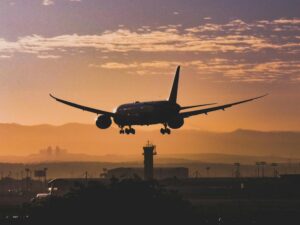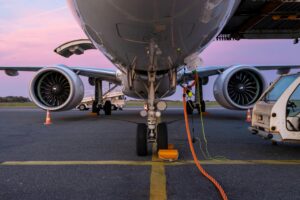As COVID-19 swept across Africa in early 2020, the continent’s aviation sector didn’t just stall—it nearly collapsed. At Uganda’s Entebbe International Airport, cargo flights plummeted from 45 aircraft carrying 210 tonnes daily to just two planes handling a mere 35 tonnes. This 83% capacity reduction wasn’t merely a Ugandan problem—it became the new reality across African skies.
Nowhere has this aviation crisis hit harder than in Nigeria, where domestic airlines already operated on razor-thin margins before the pandemic. The existential threat facing Nigerian carriers now demands urgent, decisive intervention before the sector suffers permanent damage.
The root problem? Nigerian domestic airlines operate under what might be the world’s most punishing tax regime. Between 35-40% of every passenger ticket goes directly to government taxes and levies—a staggering burden that makes profitability nearly impossible even in good times.
The Crushing Weight of Nigerian Aviation Taxes
The list of charges Nigerian carriers face reads like a masterclass in how to suffocate an industry. Domestic airlines must pay a 5% cargo sales charge, 7.5% VAT, passenger service charges, ticket sales charges, charter sales charges, aircraft inspection fees, simulator inspection fees, landing charges, parking charges, terminal navigation charges, en-route charges, extension charges, fuel surcharges, airport space rent, electricity charges, registration fees, navigational charges, overflight charges, clearance charges, and a $20 per-person Nigerian airport tax.
This tax burden creates a deeply unbalanced playing field. Nigerian carriers face charges at every operational turn while foreign airlines operating in the country enjoy preferential treatment. As passenger numbers have collapsed during the pandemic, Nigerian airlines face a perfect storm of fixed costs with virtually no revenue.
Global Aviation Relief Models
Governments worldwide have recognized that airlines represent critical national infrastructure deserving protection during this unprecedented crisis. Smart aviation authorities have implemented emergency measures including temporary tax holidays, deferred payments, and direct financial support.
Singapore slashed airport charges by 50% and provided wage subsidies for aviation workers. Australia waived aviation fuel taxes and government-imposed service fees. Germany offered Lufthansa a €9 billion rescue package with reasonable conditions attached. These interventions recognize a fundamental truth: once airlines collapse, rebuilding them becomes infinitely more costly than preserving them.
Yet Nigeria has been slow to implement similar measures at scale.
A Twelve-Point Nigerian Aviation Rescue Plan
What Nigeria needs now is a comprehensive airline rescue strategy that addresses both immediate survival and medium-term recovery. Based on global best practices and Nigeria’s specific circumstances, the following measures represent the most promising path forward:
Immediate Relief Measures
First, implement a 90-day tariff payment delay for airlines that suspended operations between March and May 2020 and can demonstrate significant financial hardship. This breathing room would provide crucial short-term liquidity.
Second, introduce temporary waivers on airport and en-route charges, fuel surcharges, and tax obligations. Every naira saved on these fees directly impacts airlines’ ability to maintain operations and workforce.
Third, eliminate aviation fuel tax with full input tax credit. Fuel represents 30-40% of airline operating costs, making this a high-impact intervention.
Fourth, temporarily reduce VAT on domestic air travel. This would stimulate demand while lowering effective ticket prices without cutting airline revenue.
Structural Interventions
For public-private partnership airports, a moratorium on revenue sharing payments to the Federal Airports Authority of Nigeria (FAAN) would preserve capital within the aviation ecosystem.
Facilitating public or private loans with subsidized interest rates would provide working capital without the stigma or dependency of direct bailouts. Asset-backed financing using aircraft or valuable landing slots as collateral has proven effective in other markets.
Incentives for airlines to retain employees through payroll tax delays would preserve the skilled workforce Nigerian aviation will need for recovery.
Competitive Rebalancing
Perhaps most importantly, Nigeria must address the fundamental imbalance between domestic and foreign carriers. Implementing income tax on foreign airlines operating in Nigerian airspace—as permitted under recent non-resident tax regulations—would both generate revenue and level the playing field.
Finally, recognition that air travel remains the only taxed mode of transportation in Nigeria should prompt a holistic rethinking of how aviation fits into the national transportation strategy.
Beyond Survival: Building Resilience
Airlines worldwide are developing innovative approaches to generate liquidity during the crisis. Major carriers have raised capital by mortgaging aircraft, using landing slots as collateral, and even converting frequent flyer mile programs into loan security. Nigerian airlines need regulatory flexibility to pursue similar creative financing approaches.
The pandemic has revealed the vulnerability of Nigeria’s domestic aviation sector, but also presents an opportunity to address long-standing structural problems. A more balanced taxation approach that recognizes aviation’s role in economic development would strengthen the sector long after COVID-19 recedes.
Time for Decisive Action
What’s at stake isn’t merely the survival of individual airlines but Nigeria’s domestic air connectivity—a critical infrastructure component for Africa’s largest economy. Every week of delay pushes more carriers toward insolvency.
The Nigerian government faces difficult fiscal choices across all sectors. However, allowing the domestic aviation industry to collapse would create far-reaching economic damage that far exceeds the cost of targeted, temporary relief measures.
The question isn’t whether Nigeria can afford to help its airlines weather this storm. The real question is whether it can afford not to.
With smart, decisive action now, Nigerian aviation can emerge from this crisis more resilient and competitive. Without it, the nation risks losing a strategic industry that took decades to build. The choice—and the responsibility—lies with policymakers today.
Disclaimer: The insights shared in this article are for information purposes only and do not constitute strategic advice. Aviation markets and circumstances vary, and decisions should be based on your organisation’s specific context. For tailored consultancy and guidance, please contact info@avaerocapital.com.




